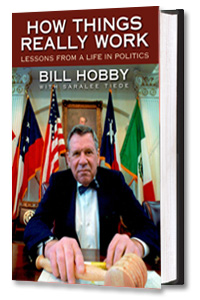The poll tax was eliminated by the Twenty-fourth Amendment to the U.S. Constitution because it was used by former Confederate States to keep poor people, black and white, from voting.
But the Texas Legislature never ratified the amendment. It almost, but not quite, did so in the last session. The proposed legislation was sponsored by two black Houston legislators: Representative Alma Allen and Senator Rodney Ellis. House Joint Resolution 39 passed the House unanimously (Speaker Craddick abstaining). It passed the Senate State Affairs Committee unanimously and was put on the Uncontested Calendar.
But, somehow, it never passed the Senate.
Maybe it would have passed if Lieutenant Governor David Dewhurst had supported HJR 39 as strongly as he (unsuccessfully) did the twentieth-century version of the poll tax. Republicans wanted to recycle the poll tax into photo ID to keep blacks and browns from voting Democratic.
How things change—in a way! In the nineteenth and twentieth centuries, Democrats imposed the poll tax to keep blacks from voting Republican.
There is certainly black humor in the history of the issue.
In 1865 the North had just won the Civil War. But somehow it didn’t feel that way to the members of Congress (all Northern, of course).
“If we won the Civil War, how come we still have a Rebel President (Andrew Johnson of Tennessee)? Well we’ll fix that! We’ll impeach him (they did) and kick him out (they didn’t)!” thought the Congressmen.
“Never mind! We’ve freed the slaves with the Thirteenth Amendment!
“Wait a minute—now that we’ve freed the slaves we’ll have to count all of them (not just 3/5) in apportioning Congress and the Rebs will have a bunch more members in the House.
“We’ll have to fix that! We know the Rebs aren’t going to let the blacks vote. So we’ll pass the Fourteenth Amendment.” The Fourteenth Amendment says that if a state “in any way abridged” the right to vote of any male over 21 that state’s representation in Congress would be reduced. (The federal Constitution wasn’t amended to let women vote until 1920. The Texas Constitution, thanks to me father, was amended earlier.)
The Yankees were right, but they didn’t mean what they said. Sure enough, the Rebs imposed poll taxes to keep blacks from voting Republican, but I don’t know that any state’s representation was ever reduced.
After Reconstruction eleven Southern states passed poll taxes to keep poor black and white people from voting. Texas passed it in 1902.
In 1962, President John F. Kennedy urged Congress “to finally eliminate this outmoded and arbitrary bar to voting. American citizens should not have to pay to vote.”
On January 23, 1964, the Twenty-Fourth Amendment was ratified to ban the poll tax in federal elections.
On February 4, 1964 President Lyndon B. Johnson, the first Texan to be president, said that abolishing the tax requirement, “reaffirmed the simple but unbreakable theme of this Republic. Nothing is so valuable as liberty, and nothing is so necessary to liberty as the freedom to vote without bans or barriers.… A change in our Constitution is a serious event.… There can now be no one too poor to vote.”
In 1964, Texas was one of only five states still levying a poll tax. Following the recommendation of Gov. John B. Connally, the Legislature had proposed an amendment in 1963 repealing the poll tax provision in the Texas Constitution, but it was rejected by the voters. But in 1966 Texas voters finally approved another amendment doing the same thing.
Maybe next time the Texas Legislature will ratify the Twenty-fourth Amendment to the United States Constitution to ban the poll tax, a long-overdue gesture. Maybe the Lege will even ratify the Twenty-third Amendment letting citizens in the District of Columbia vote for President.
Bill Hobby was Lieutenant Governor of Texas 1973-91. Hobby
can be reached at [email protected].
Contact information for editors:
2131 San Felipe
Houston, Texas 77019
713-521-0960

